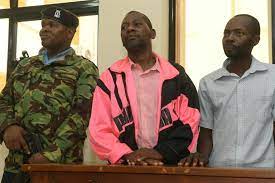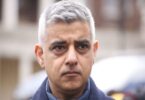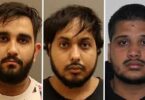MOMBASA, Kenya (AFP): A Kenyan cult leader accused of inciting and possibly forcing his followers to starve themselves to death appeared in court Friday in connection with the deaths of more than 100 people found buried in mass graves.
The deeply religious Christian-majority country has been stunned by the discovery of the graves last month near the Indian Ocean coastal town of Malindi, in what has been dubbed the “Shakahola forest massacre.”
Self-proclaimed pastor Paul Nthenge Mackenzie, who is due to face terrorism charges for allegedly urging followers to starve to death “to meet Jesus,” appeared in the dock in Kenya’s second-largest city of Mombasa.
Mackenzie, dressed in a pink and black jacket and brown trousers and accompanied by his wife and child, was brought in by about a dozen police officers along with 17 other defendants.
According to investigators, the other suspects are accused of operating an armed “enforcer gang” tasked with ensuring that no one broke their fast or left their forest hideout alive.
Autopsies carried out on 100 bodies have found that while starvation appeared to be the main cause of death, some of the victims — including children — were strangled, beaten, or suffocated.
Prosecutors are asking to hold Mackenzie, who founded the Good News International Church in 2003, for another 90 days until investigations are completed.
Ezekiel Odero, a wealthy and high-profile televangelist, was also arrested in Malindi last week in connection with the same case, and was granted bail at a court hearing on Thursday.
A total of 109 people have so far been confirmed dead, most of them children.
Odero is suspected of murder, aiding suicide, abduction, radicalization, crimes against humanity, child cruelty, fraud and money laundering.
Prosecutors say they have credible information linking the corpses exhumed at Shakahola to the deaths of several “innocent and vulnerable followers” from Odero’s New Life Prayer Center and Church.
In his filing to the court, Odero said he wanted to “strongly disassociate” himself from Mackenzie and disagreed with his teachings.
In addition to the terrorism charges prosecutors plan to file, Mackenzie stands accused of murder, kidnapping, cruelty toward children among other crimes in court documents seen by AFP.
The former taxi driver turned himself in on April 14 after police acting on a tip-off first entered Shakahola forest, where some 30 mass graves have now been found.
Questions have been raised about how Mackenzie, a self-styled pastor with a history of extremism, managed to evade law enforcement despite his prominent profile and previous legal cases.
The horrific saga has seen President William Ruto vow to intervene in Kenya’s homegrown religious movements, and thrown a spotlight on failed efforts to regulate unscrupulous churches and cults that have dabbled in criminality.







